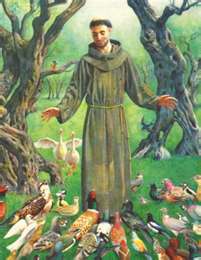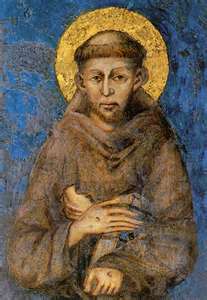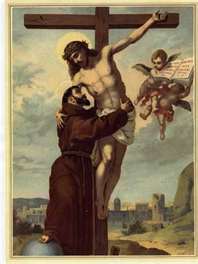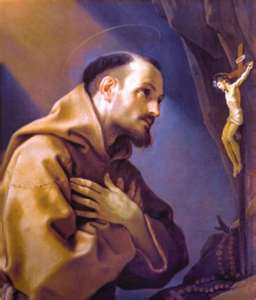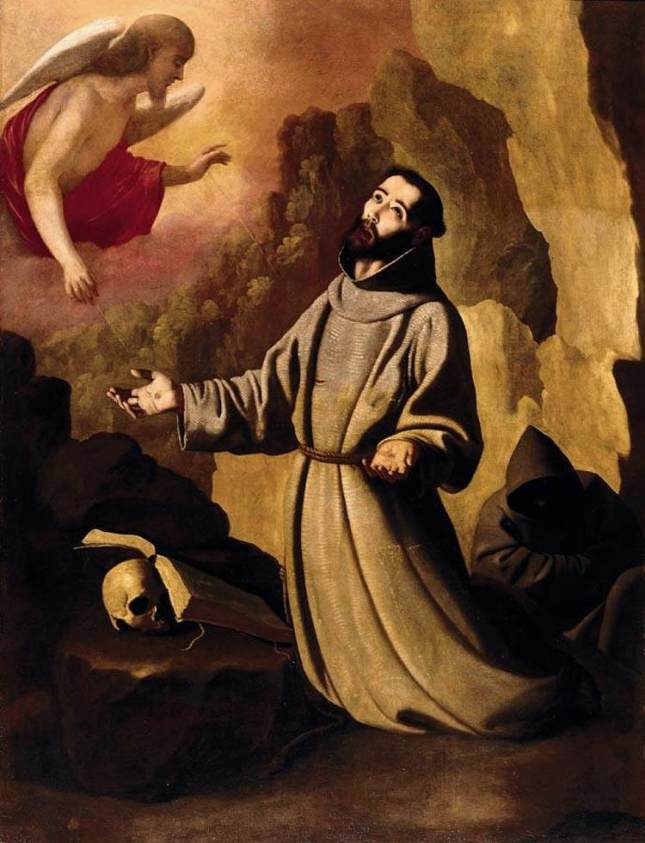FRANCIS’ PATIENT ENDURANCE AND HIS DEATH
[St. Bonaventure, Major Life of Saint Francis, Chapter XIV]
1. Francis now hung, body and soul, upon the Cross with Christ; he burned with love for God worthy of a seraph and, like Christ, he thirsted for the salvation of the greatest possible number of human beings. He could not longer walk because of the nails protruding from his feet, and so he had himself carried, half-dead as he was, through the towns and villages, to encourage others to bear Christ’s Cross. To the friars he used to say, “My brothers, we must begin to serve our Lord and God. Until now we have done very little.” He longed with all his heart to return to the humble beginning he had made at first and to nurse the lepers once more, as he had done before, making his body which was already worn out with toil serve him once again as it had served him before. With Christ for his leader, he proposed to achieve great victories and, even as his limbs bordered on collapse, he hoped to triumph over his enemy the Devil once again, because he was fervent and courageous in spirit. The goad of love never ceases to urge a person on to greater efforts and leaves no room for discouragement or sloth. In Francis, however, spirit and flesh were so much in harmony and so prompt to obey that, as his spirit strained after the height of sanctity, his body – far from being an obstacle – tried to surpass its desires.
2. Merit, as we know, is crowned by patient endurance, and so Francis began to suffer all kinds of illness, so that his treasure might be augmented. There was scarcely a single part of his body which did not have some pain to suffer. The prolonged agony he endured eventually reduced him to a state where he had no flesh left and his skin clung to his bones. He was hemmed in with agonizing pain, but he called his trials his sisters, not his pains.
When he was suffering greater than usual one time, a friar who was a very simple man said to him, “Brother, you should pray to God and ask Him to be easier on you. He seems to be treating you too roughly.” The saint groaned aloud at the words and exclaimed, “If I did not know your complete simplicity, I would never let you come near me again, because you dared to find fault with God for the way He is treating me.” Then he threw himself on the ground, shaking every bone in his body with the fall, although he was worn out from his long illness, and kissing the earth, he added, “I thank you, my Lord and God, for all the pains I suffer and I beg You to make them a hundred times worse, if You want to. Nothing would make me more happy than to have you afflict me with pain and not spare me. Doing your will is consolation enough, and more than enough, for me.” To the friars he seemed like a second Job; the vigor of his mind increased as his body became weaker. He knew the day of his death a long time beforehand and, as it approached, he told the friars that must soon fold his tent (cf. 1 Pet 1:14), as Christ had revealed to him.
3. For two years after he had received the stigmata – that is twenty years after the beginning of his religious life – Francis endured the purifying blows of various illnesses which formed him like a stone ready to be fitted into the heavenly Jerusalem and raised him to the height of perfection, like ductile metal under the blows of a hammer. The he asked to be brought to St. Mary of the Portiuncula, so that he might yield up his spirit where he had first received the spirit of grace. When he arrived there, he was anxious to show that he had no longer anything in common with world, after the example of Eternal Truth. In his last serious illness, which was destined to put an end to all his suffering, he had himself laid naked on the bare earth, so that with all the fervor of his spirit he might struggle naked with his naked enemy in that last hour which is given him to vent his wrath. As he lay there on the ground, stripped of his poor habit, he raised his eyes to heaven, as his custom was, and was lost in the contemplation of its glory. He covered the wound in his right side with his left hand, to prevent it being seen, and he said to the friars, “I have done what was mine to do. May Christ teach you what is yours.”
4. His companions were overcome with sorrow and wept bitterly; one of them whom the saint called his guardian was inspired by God and took a habit with a cord and trousers, and offered them to Christ’s beggar, as he realized this was what he wanted. “I am giving you the loan of these,” he said, “as a beggar, and you are to take them in virtue of obedience.” The saint was delighted and his heart overflowed with happiness; this proved that he had kept his faith with Lady Poverty to the end. Raising his hands to heaven, he gave praise to Christ for freeing him from all his burdens and allowing him to go freely to meet Him. He had acted as he did in his anxiety for poverty, and he was unwilling even to keep a habit unless it was on loan. Christ hung upon His Cross, poor and naked in great pain, and Francis wanted to be like Him in everything. That was why at the beginning of his religious life he stood naked before the bishop, and at the end he wished to leave the world naked. In obedience and love he begged the friars who were standing by him to let him lie naked on the ground, when they saw he was dead, for as long as it takes to walk a mile unhurriedly.
Surely he was the most Christ-like of men! His only desire was to be like Christ and imitate Him perfectly, and he was found worthy to be adorned with the marks of His likeness; in his life he imitated the life of Christ and in his death he imitated His death, and he wished to be like Him still when he was dead.
5. As the moment of his death drew near, the saint had all the friars who were there called to his side; he spoke to them gently with fatherly affection, consoling them for his death and exhorting them to love God. He mentioned especially poverty and patient endurance and the necessity of holding to the faith of the holy Roman Church, and gave the Gospel preeminence over any other rule of life. The friars were grouped about him and he stretched out his arms over them in the form of a cross, because he loved that sign, and blessed all the friars, both present and absent, in the power and in the name of the Crucified. Then he added, “I bid you good-bye, all you my sons, in the fear of God. Remain in Him always. There will be trials and temptations in the future, and it is well for those who persevere in the life they have undertaken. I am on my way to God, and I commend you all to his favor.”
When he had finished his inspiring admonition, he told them to bring a book of the Gospels and asked to have the passage of St. John read which begins, “Before the paschal feast began” (Jn 13:1). Then, as best he could, he intoned the psalm, “Loud is my cry to the Lord, the prayer I utter for the Lord’s mercy,” and recited it all down to the last verse, “Too long have honest hearts waited to see you grant me redress” (Ps 142:1-8).
6. At last, when all God’s mysteries had been accomplished in him, his holy soul was freed from his body and assumed into the abyss of God’s glory, and Francis fell asleep in God. One of the friars, a disciple of his, saw his soul being borne on a white cloud over many waters to heaven, under the appearance of a radiant star. It shone with the brightness of sublime sanctity, full of the abundance of divine wisdom and grace which had earned for him the right to enter the home of light and peace, where he rests with Christ for ever.
The provincial minister of the friars in the Terra di Lavoro, Brother Augustine, a holy and upright man, was at death’s door at that time. He had been unable to speak for some time, but now those who were with him suddenly heard him crying out, “Wait for me, father. Wait! I am coming with you.” The friars were amazed and asked him to whom he was speaking. He replied, “Can’t you see our father Francis. He is going to heaven.” There and then his holy soul left his body and followed his father.
The bishop of Assisi was on a pilgrimage to the shrine of St. Michael on Monte Gargano at that time, and St. Francis appeared to him on the night of his death, saying, “See, I am leaving the world and going to heaven.” When he got up in the morning, the bishop told his companions what had happened. On his return to Assisi, he investigated the matter carefully and came to the conclusion that St. Francis left the world at the time he appeared to him in his vision.
At the time of St. Francis’ death, when it was already dusk, a great flock of larks gathered over the building, although they normally prefer the light of day and avoid the shades of night. There they remained, flying about and singing with unusual joy, clearly testifying by the sweetness of their song to the glory of the saint who had so often called upon them to praise God.
Note: Taken from Marion A. Habig OFM (Editor), ST. FRANCIS OF ASSISI – WRITINGS AND EARLY BIOGRAPHIES – English Omnibus of the Sources for the Life of St. Francis, Quincy, Illinois: Franciscan Press – Quincy College, 1991, pages 737-741.
